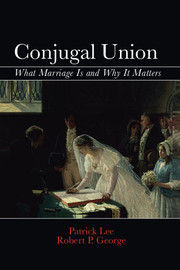5 - Marriage and the Law
Published online by Cambridge University Press: 05 September 2014
Summary
Two questions are central today in discussions of how the law should treat marriage. First, should the law continue to recognize marriage as essentially a relationship between a man and a woman, or should the norm of sexual complementarity be eliminated from the legal definition of marriage. Second, what stance should the law take on the issue of whether marriages are meant to be permanent?
Some Arguments for Same-sex “Marriage”
Marriage is not merely a private reality. If John and Sally get married, their marriage is publicly and legally recognized. In a great many ways, the political community will promote, protect, and encourage their relationship. But if Jim and Steve wish to get married, in most states, they will be unable to obtain a marriage license. Most states (and most nations) do not recognize same-sex “marriages.” We have argued that in reality, there is no such thing as a same-sex marriage, that marriage requires a man and a woman (plus other requirements, such as proper consent). So far, however, we have discussed only the moral and social reality of marriage. One might still claim that these positions about the moral and social nature of marriage should not be enshrined in civil law. So, should the political community grant marriage licenses to same-sex partners? We argue that it would be unjust and harmful for the state to do so and that the states should retain (or re-instate, as the case may be) the norm of sexual complementarity in defining marriage.
- Type
- Chapter
- Information
- Conjugal UnionWhat Marriage Is and Why It Matters, pp. 97 - 140Publisher: Cambridge University PressPrint publication year: 2014



